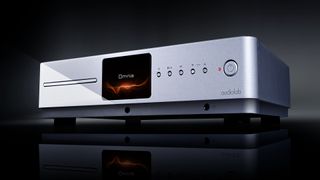Audiolab's newest creation is an all-in-one, just-add-speakers music system that the British firm calls the Omnia.
Housed in a swish aluminium enclosure with a crisp, minimalist aesthetic, the Omnia promises to cater for a music lover’s every need – from digital streaming to physical CD and vinyl collections. To that end, it sports an integrated CD player, extensive inputs for external sources – including a phono stage for a turntable – hi-res network streaming, the ability to form part of a synchronised multi-room system and high-quality amplification to make the most of whichever speakers or headphones you choose to partner it with.
Most importantly, Audiolab promises that the quality of its internal design – right down to each individual circuit component – means that however you use it, the Omnia boasts a level of sonic performance more readily expected of bulkier and more expensive hi-fi systems comprised of multiple separates.
Streaming is at the forefront of music consumption in 2021, which is why it is a critical part of the Omnia’s design, with hi-res network streaming supported over dual-band wi-fi and Ethernet cable, alongside Bluetooth for wireless reception from smartphones and devices. But Audiolab recognises that plenty of people still treasure (and wish to enjoy) their physical music collections – and however you choose to play your music, the Omnia has it covered.
An integrated CD player is perhaps unusual in a 2021 single-box music system, but the Omnia’s transport mechanism incorporates a high-precision optical system and low-friction loading tray, with an electronic data buffer and sturdy aluminium base and chassis to tackle any CD vibration.

For vinyl lovers, the integral MM phono stage features a high-quality, low-noise, JFET-based circuit with precise RIAA equalisation – just add your chosen turntable. Other external sources can be connected via a range of digital (asynchronous USB and S/PDIF) and line-level analogue inputs, utilising the Omnia’s 32-bit ES9038Q2M ESS Sabre DAC, analogue preamp and power amp stages.
And should you wish, you can bypass the separate amp stages, giving you the option to connect an external preamplifier or power amplifier.
In the centre of the Omnia’s aluminium front panel is a 4.3-in full-colour screen, ready to display information such as system settings, format data and track details. It can even be set to display a VU meter in ‘analogue’ or ‘digital’ form, showing real-time decibel levels for the left and right channels.
Despite its simplistic aesthetic, the Omnia sports cutting-edge sophistication under the bonnet. One critical element here is the post-DAC active filter, which Audiolab says its design team has paid great attention to, using op-amps specially selected for their synergy with the Sabre DAC. PCM audio is supported to 32-bit/768kHz, alongside DSD to 22.5MHz (DSD512) with all significant hi-res and lossless audio formats seemingly catered for, including FLAC, ALAC, AIFF and WAV, as well as compressed legacy formats.
The Omnia's network streaming is powered by DTS Play-Fi, a gateway to a wealth of music services, including Spotify, Tidal, Amazon Music, Deezer, Qobuz, Audacy, TuneIn, iHeartRadio and SiriusXM. The DTS Play-Fi app (available for iOS or Android) also functions as your trusty music butler, capable of serving up a streaming library stored on a DLNA-compatible NAS drive or media server.
The Omnia also delivers full decoding of MQA, Tidal's hi-res streaming tech, so the complete ‘three unfold’ decoding process is performed internally, as opposed to just the final unfold in the manner of an MQA ‘renderer’.
In standard mode, which is optimised for multi-room bandwidth, Play-Fi streams at up to 16-bit/48kHz – akin to CD-quality. By engaging Play-Fi’s Critical Listening Mode, hi-res audio up to 24-bit/192kHz may be streamed to the Omnia over Wi-Fi or Ethernet cable, without transcoding or down-sampling.
But there are other ways to stream music wirelessly to the Omnia besides the Play-Fi app! Spotify Connect and Bluetooth 5 are also onboard for aptX, aptX LL, AAC and SBC, and the product is Roon Ready.

Over to the analogue domain, and the Omnia’s preamp and power amp stages incorporate short, direct signal paths and high-quality components to preserve sonic purity. Volume is adjusted under microprocessor control, outputting directly to the Class AB output stage (no class D amplification here!) and boasting 50W per channel into 8 ohms, with maximum current of 9 Amps into difficult loads – which should be sufficient to drive whichever speakers you choose to hook up to the Omnia.
You'll also get a comprehensive selection of cable inputs for analogue and digital sources. Two USB inputs, Type A and Type B, cater for connection to PCs, Macs, smartphones, tablets and digital storage devices, complemented by four S/PDIF digital inputs (two coaxial and two optical) and an Ethernet port for network connectivity. Four stereo RCA analogue inputs are also supplied – three line-level, plus one MM phono input for a turntable.
And in addition to a set of gold-plated binding posts to connect your chosen speakers, headphone fans are served by a front-mounted 6.3mm headphone output fed by a dedicated amp. Other outputs include a stereo-RCA pre-out option, as well as coaxial and optical digital outputs.
The Audiolab Omnia will be available in December, in a choice of black or silver, at an RRP of £1599 (approximately $2140 and AU$2965, although these figures are unofficial).
MORE:
Read our extensive collection of Audiolab reviews
See our pick of the best hi-fi systems 2021: micro, vinyl and streaming music systems
Now search for the best early Black Friday deals
